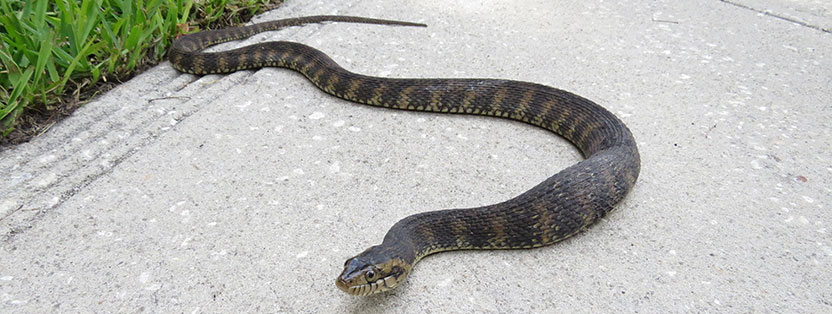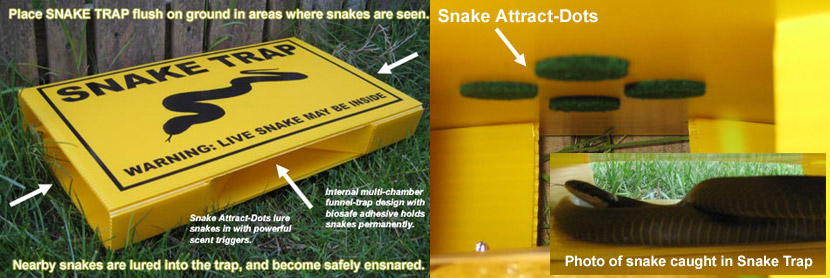
An analysis of the effectiveness of various Snake Repellents
How to build and install different types of Snake Fencing
Types of pets or animals that keep snakes away Snake Guard Animals
The easiest way to keep a snake away from your home or property is to make the area unattractive to the reptile. Snakes will look for areas favorable to continued survival. This means the snake will want sufficient shelter and food if it is to become a permanent resident. Unfortunately, many of the landscaping items we like to use as homeowners are also ideal objects for snakes to use for shelter. Or, if not providing shelter to the snake, the rock walls and thick shrubbery can provide a home to a variety of snake prey animals such as mice, frogs, chipmunks, and a host of insects. Not only will poor choices in landscaping features add to the likelihood of snakes in your yard, poor manicuring of your property will also encourage snakes and their food sources to multiply. Long grass, long trim, overgrown gardens and hedges are ideal places for ambush predators like snakes to travel. To keep snakes away, consider smart choices when it comes to your property. Chose mortared rock walls instead of free stacked stone; use crushed rock for ground cover instead of mulch; keep the base of plants weed-free and open. Properly care for your yard and any border areas that need separate trimming. If you burn wood, consider stacking your wood at least a foot off the ground to discourage a snake from using the area for shelter. In addition to these recommendations, the foundations of the buildings on your property should be checked. Any holes or gaps should be filled, and any buildings elevated off the ground should have a snake barrier installed around the base. While fencing in an entire yard against snakes isn’t always practical, a small area fenced in for the safe use of children could be considered as an alternative.
Snake fences should be flush to the ground and should extend outward at an angle to prevent snakes from climbing over. Most snakes are terrestrial but boast excellent climbing skills. If the desire is there, a snake can scale a vertical surface. Fences should be angled and smooth to prevent a breach.

There are no chemical repellents for snakes. A variety of home remedies exist in
an attempt to keep snakes away, and some commercial texture barriers are available, but most have met with poor reviews. Mothballs and other scent deterrents have very little effect on snakes. The sense of smell for a serpent is not smell as humans experience the sensation. Snakes use their ability to identify, not necessarily to determine danger. Scent does work to lure snakes to a location, a trick often employed in trapping and removal. Texture barriers are mostly mythical. Snakes spend their entire lives crawling over a variety of surfaces, so a long piece of coarse rope, line of chunky gravel, or commercial granules won’t prevent a snake from entering an area.
In areas where poisonous snakes are not a concern, some animals have been found to be useful in snake prevention. Turkeys are surprisingly adept at locating and grouping around a snake. They can harass a snake enough to encourage it to move away from the immediate area. Cats and dogs will also hunt snakes. With any domestic animal, the risk of snake bite is high. A non-venomous bite can result in debilitating injury. Domestic animals should never be used in poisonous snake prevention.
Wild animals can prove useful in keeping snakes away. Owls and various birds of prey will hunt snakes. The chance of an owl or falcon swooping into your yard to catch a problem snake is highly unlikely and should not be relied on as a source of protection.
For snakes that are climbing into bird houses, sticky substances added to the trunks of trees can be a practical method to prevent devastation to the song bird population. Sticky substances are only useful in small areas and are not useful for entire property protection.
No matter what techniques you use to try to keep snakes away, the ultimate method of prevention is simply a matter of being proactive. By making smart decisions and being aware of the habitat your yard provides, you will be able to prevent snakes from becoming a problem.
You basically have two options for getting rid of your snake(s). First,
you can call a professional wildlife expert from my below directory.
This person can catch and remove the snake(s) and take other actions
necessary to solve the snake problem. Second, you can purchase a snake
trap if you wish to catch the snake yourself.
Option 1 - HIRE A PROFESSIONAL
We can solve your snake problem for you. Our nationwide group of snake specialists services 95% of the US population. Click here to find your local snake removal expert in your town. Below are just some of our more popular areas:Option 2 - BUY A SNAKE TRAP
If a snake is indoors, a trap will work. I do not recommend using a glue-based trap outdoors, because it can inhumanely catch other small critters. I have reviewed and field tested several snake trap designs, and the one featured below is the most durable and effective. It is the highest quality snake trap available on the market. Read more about Snake Trap.
How to keep snakes away from your property: When it comes to keeping snakes away from your house, you will find that you will have a much more difficult time if your property has insects, animals or vegetation. The reptiles may be a danger to homeowners in many different parts of the world. Taking preventative measures to keep snakes away is much more preferable to dealing with one or more snakes that have found their way onto your property.
Snakes are the same around the world in that they are looking for a steady supply of food and a safe place where they can live. In order to keep snakes off your property, you have to make sure that there is nothing to attract them there. You will have to roll up your sleeves and do some work in the yard.

You should remove the weeds, piles of debris, excess vegetation and any places where snakes may hide. Lawn maintenance is important; you should mow the yard on a regular basis. This is the way that you can limit the populations of insects and mice that might make a tasty meal for a snake. You should keep the firewood pile elevated off of the ground. It’s best to avoid having bird baths or bird seed around, and be sure to remove all the nuts and fruits that may fall on the lawn. Check and make sure that you seal all crevices in the foundation on the house so that the snake will not have easy access to your living space. You should also seal any openings or vents that can be found around the plumbing that may be used for exiting or entering points by the snake.
When you eliminate the food of the snake like insects and rodents, the snake will not find your property very attractive. If you have small pets, like a small dog or a kitten, that spend time in the yard, you will want to be particularly careful about keeping snakes away.
Snakes can be kept away from gardens by the use of a mesh enclosure that can protect the entire area. Fencing can also be bought from the hardware store. You can consider using natural repellents. However, these may not be very effective on their own. When used in combination with the other suggestions mentioned, you should be able to successfully avoid snakes coming on to your property.
For more information, go to my Snake Removal - How to Get Rid of Snakes home page. I also have articles on these topics:
Snake in the Garage
Does sulfur or lime keep snakes away?
Do mothballs help repel snakes?
Will a high pitch sound machine repel snakes?
Will a pest control company remove a snake